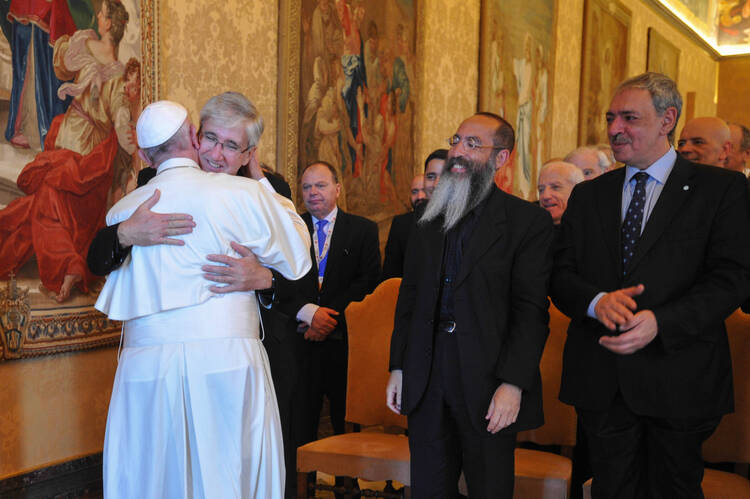“The believer is a defender of creation and of life and cannot remain silent or [stand] with arms crossed before the annihilation with impunity of so many rights,” Pope Francis told 118 participants from 18 countries of the American continent at an encounter for intercultural and interreligious dialogue held at the Vatican, Sept. 7-8.
Indeed, “the man and woman of faith is called to defend life in all its stages, physical integrity as well as fundamental freedoms, such as freedom of conscience, of thought or expression and of religion,” he told his audience, which included Jewish, Christian and Muslim participants, supreme court judges from some countries and political personalities, including one of Al Gore’s daughters.
RELATED: Interreligious Leaders
The event, the first of its kind, was organized by the Institute for Interreligious Dialogue (I.D.I.) of Buenos Aires—with which Francis has worked closely since 2001, first as archbishop and now as pope—together with the Organization of American States and in collaboration with the Pontifical Council for Interreligious Dialogue.
Last year, the O.A.S. (which has 35 member states on the American continent) invited the I.D.I. to be the promoter of a continental project called “America in Dialogue” that would focus on “Laudato Si’,” the pope’s encyclical, which, the organization said, offers a vision for the care of and responsibility for planet Earth that is shared by all religious traditions. The three founders of the I.D.I.—Rabbi Daniel Goldman, the Islamic Center director Omar Abboud and the Rev. Guillermo Marco (the pope’s former press officer)—presented the proposal to the pope last November and he gave it his blessing.
Today, Francis spent 90 minutes with the group, underlining the importance he gives to the initiative, which aims to create a network for intercultural and interreligious dialogue across the American continent and in each country to promote a culture of encounter.
Francis warmly thanked the O.A.S. and I.D.I. for this initiative and affirmed that “religions have a very important role in the task of promoting the care and respect for the environment” and in “promoting a true education, at all levels, that helps to spread a responsible and attentive attitude towards the needs of our world and, in a special way, to protect, promote and defend human rights.”
He emphasized the vital importance of interreligious dialogue and cooperation in the 21st century for “the promotion of a culture of sincere and respectful dialogue.” Then, in a warning to the American continent, he said, “If reciprocal respect does not exist religious dialogue does not exist; it is the basis to be able to walk together and face the challenges.”
He reminded participants that the world is “constantly observing us believers” to verify “what is our attitude to our common home and human rights.” Moreover, it is asking us “to collaborate among ourselves and with men and women of good will that profess no religion, so that we can give effective responses to the many plagues of our world.” He listed those plagues: war and hunger, the environmental crisis, violence, corruption and moral degradation, the crisis of the family and of the economy, and above all the lack of hope.
Then, turning to the abuse of religion to justify violence and terrorism, Francis noted that “at times, the name of religion is used to commit atrocities, such as terrorism, and to sow fear and violence and, as a consequence, religions are indicated as responsible for the evils that surround us.”
He told participants and the religious communities they represent that “it is necessary to roundly condemn in a joint way these abominable actions and to take distance from all that seeks to poison souls, to divide and destroy coexistence.”
It is necessary, too, he said, “to show the positive values inherent in our religious traditions so as to be able to give hope to people” and “to share the sorrows as well as the hopes, so as to walk together, caring for each other, and also for creation, in defense and promotion of the common good.”
The symposium closed with a press conference at the Augustinianum in Rome on Sept. 8, and afterwards each of the I.D.I. founders told America what most impressed them during the event.
Father Guillermo Marco said he was deeply impressed at “the willingness of all the participants to work together for a common cause.” Rabbi Daniel Goldman said the meeting revealed that the big challenge today is “how to open dialogue, how to open hearts.” He said most of today’s leaders are failing in this respect. Omar Abboud, for his part, underlined “the importance of ‘Laudato Si’’ in promoting dialogue, because it is not a document for Catholics only. It connects with what is said in the traditions of all the other religions. It shows what we have in common and on which we can work together.”
All three affirmed that in preparation for this event, they could see that the idea of “interreligious and intercultural dialogue” is spreading throughout the American continent. This year representatives of 18 of the 35 member states of the O.A.S. attended, and they feel confident that many more will attend the next meeting in Chile in March 2017. The government of Chile has offered to host it.








